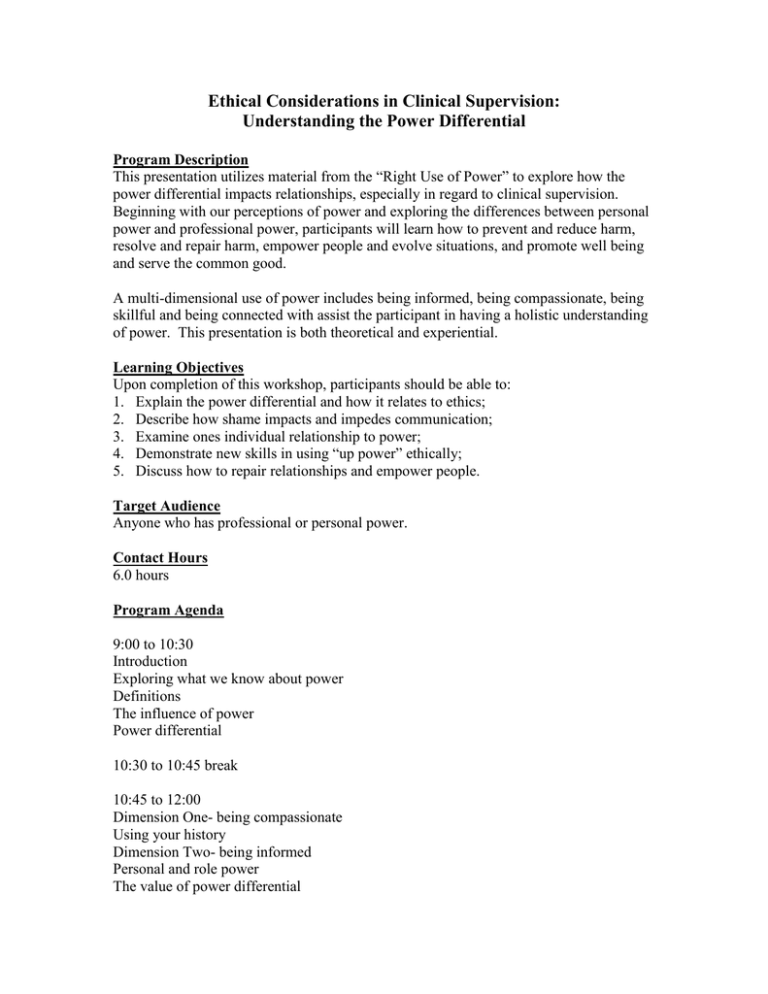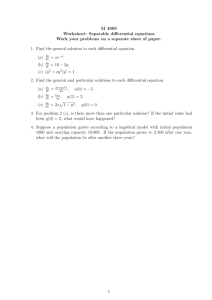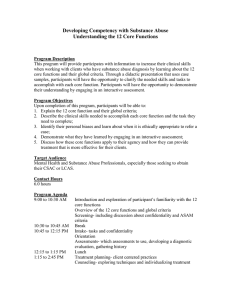Ethical Considerations in Clinical Supervision: Understanding the Power Differential
advertisement

Ethical Considerations in Clinical Supervision: Understanding the Power Differential Program Description This presentation utilizes material from the “Right Use of Power” to explore how the power differential impacts relationships, especially in regard to clinical supervision. Beginning with our perceptions of power and exploring the differences between personal power and professional power, participants will learn how to prevent and reduce harm, resolve and repair harm, empower people and evolve situations, and promote well being and serve the common good. A multi-dimensional use of power includes being informed, being compassionate, being skillful and being connected with assist the participant in having a holistic understanding of power. This presentation is both theoretical and experiential. Learning Objectives Upon completion of this workshop, participants should be able to: 1. Explain the power differential and how it relates to ethics; 2. Describe how shame impacts and impedes communication; 3. Examine ones individual relationship to power; 4. Demonstrate new skills in using “up power” ethically; 5. Discuss how to repair relationships and empower people. Target Audience Anyone who has professional or personal power. Contact Hours 6.0 hours Program Agenda 9:00 to 10:30 Introduction Exploring what we know about power Definitions The influence of power Power differential 10:30 to 10:45 break 10:45 to 12:00 Dimension One- being compassionate Using your history Dimension Two- being informed Personal and role power The value of power differential 150% equation Client vulnerabilities 12:00 to 1:00 Lunch 1:00 to 2:30 Understanding Shame and how to reduce it Dimension Three: Being Skillful Ethically pro-active Typical ethical violations Factors leading to misuse Barriers and challenges Responsibility 2:30 to 2:45 break 2:45 to 4:30 Dimension Four: Being connected Resolving difficulties Signs of escalation Reframing conflict Successful resolutions, what do people need? Conclusion and wrapping up Faculty Ellen Pallme, MSW, LCSW, LCAS, CCS is a practicing licensed clinical social worker and addictions specialist. Since 1995, she has worked extensively with children and families of multicultural backgrounds, as a tutor, homeschooling consultant and personal mentor. For many years, Ellen volunteered in her faith community to counsel and guide trauma survivors. She has been in the forefront to develop child protection programs and trainings throughout the larger community. In 2005, she began working as a crisis responder for sexual assault victims and trainer for new recruits. For five hears she was an intensive in-home team supervisor. Ellen is currently engaged as a supervisor for those seeking the LCAS credential and providing trainings to further education about substance abuse and co-occurring disorders. 2

